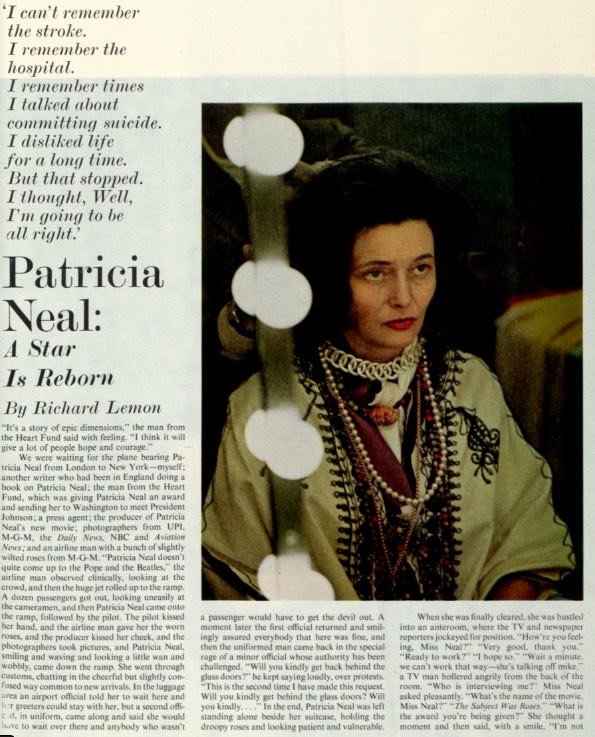-Originally published October 5, 1968-
Three years ago, while filming a movie, Patricia Neal had a stroke, followed quickly by two more, which left her in a coma for more than two weeks. She came out of the coma with badly impaired speech, weakened memory, and a bad leg. In a month she was well enough to leave the hospital.
For a long time it was uncertain how much of a recovery she would make. “I’ve got no mind, you know,” she used to say, because she was hobbled by aphasia, which meant that she would often draw a blank on everyday words. Struggling, she would create preposterous pseudo-words, and husband Roald Dahl, even if he knew what she was asking for, would refuse to bring it until she got the word right. “You make me skitch, that’s what you do,” she said to him once, while he waited for her to locate the word cigarette. “You give me the sinkers. … I want a … a … want an oblogon.”
“Somebody get Pat an oblogon,” Dahl said.
“Now stop it!” she said. “I’ll go crazy if I don’t have one. I’ll jake my dioddles.”
The best thing I have heard about the special quality of that time was an account of a moment when she was trying to read Beatrix Potter’s The Tale of Pigling Bland to her son, Theo. “I haven’t the slightest idea what I’m reading,” she said finally, tossing the book down in despair.
“You mustn’t worry about that,” Dahl said without hesitation. “That’s Potter’s toughest book. It’s not at all easy to follow.”
I asked whether she would give me her view of the strokes and their aftermath. “I can’t remember that day,” she said. “I’m told we shot some scenes with a donkey. I can’t remember the stroke. I remember the hospital a little bit. I was a fantastic idiot. They’d sit me up in a chair. They used to pick me up and I’d be like this” — she went limp — “and they were laughing and I got angry … I really was … a great idiot. For a while I had double vision. When we got home, the chemist had sent a bottle of champagne, and I drank one glass — and I saw double no longer.”
She had been pregnant when she had the strokes, but the baby, Lucy, had a normal birth. By April 1967, Miss Neal was enough recovered to come to the Academy Awards, where she received a standing ovation and read a speech — though she was still a long way from recovery.
On the last day of rehearsals for The Subject Was Roses, Patricia Neal said, “I’m eager to get started.” Sitting in a small dressing room, she said, “My only trouble is remembering lines. I used to learn lines amazingly, and now I can’t and it makes me mad. Toward the end of this script, I have three pages in a row.”
The first scene of The Subject Was Roses was shot in four takes, two of which were printed. Miss Neal could remember hardly anybody’s name, but the only line she had great trouble with was, “I can’t remember.”
—“Patricia Neal: A Star Is Reborn”
by Richard Lemon, October 5, 1968

This article is featured in the September/October 2018 issue of The Saturday Evening Post. Subscribe to the magazine for more art, inspiring stories, fiction, humor, and features from our archives.
Become a Saturday Evening Post member and enjoy unlimited access. Subscribe now




Comments
Thank you Post Editors for reprinting this feature in its entirety from 1968 on Patricia Neal. What an inspiring, fantastic woman she is. To realize that she even SURVIVED 3 strokes in the first place is a miracle from God. I can’t imagine having to re-learn literally everything from scratch all over again. I can understand her thoughts of suicide, but she persevered past that despite all the obstacles she had in the ’60s, with losing her daughter and nearly losing her son just a few years earlier. I can only wonder how much that played a part in the strokes combined with the smoking. The early part of the feature really shows her personality and sense of humor being questioned that reminds me of my own. It’s sweet she had concerns how Milton Greene’s photos would come out. They came out great, for what else would you expect from Marilyn’s photographer extraordinaire?! What we take away from this is the human spirit’s basic desire to triumph over tragedy; never giving up, no matter what. I’m so pleased she not only resumed her career, but lived a good long life after 1968, not passing away until 2010.